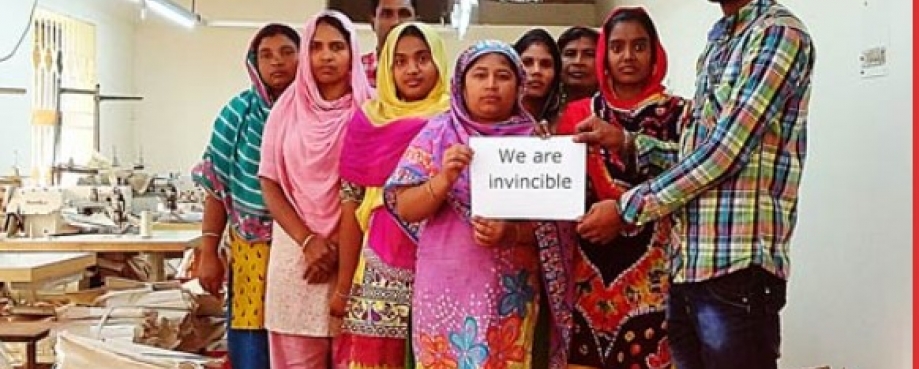
In this guest blog, Jay Kerr of NoSweat describes how Oporajeo, a worker-owned garment factory set up in the aftermath of the Rana Plaza Disaster, is being supported to survive COVID-19
Covid-19 has had a devastating impact on the garment industry in Bangladesh as a million workers are facing unemployment due to the loss of orders from major brands, as the world went into lockdown.
One factory struggling to survive is a worker-owned factory set up by survivors of Rana Plaza and activists involved in the rescue efforts.
Out of the crisis that hit when the Rana Plaza factory complex collapsed, tragically killing 1,138 people, came this symbol of hope and survival. Oporajeo, which means "invincible" in Bengali, provided a new life for a group of garment workers, gave them a say in their own work and ensured that the pay they earned was enough for a decent life.
Over the past 7 years Oporajeo has faced many challenges, but has lived up to its name by coming through them, and growing into a factory of 95 workers, earning higher than the national minimum and having a democratic voice in their work.
For the past few years Oporajeo has been working with No Sweat, a British anti-sweatshop campaign group that began producing its own brand of “T-shirts that fight sweatshops” in 2017. Made by Oporajeo and sold for wholesale in the UK by No Sweat to bands, trade unions and campaign groups, these T-shirts have been raising funds to support No Sweat’s campaign against exploitation in the garment industry.
One of the founders of Oporajeo, Kazi Monir Hossain, has said: “All of us at Oporajeo are equal. We are workers and we make our decisions together, ensuring we all benefit. Making clothes for No Sweat means our work can help other garment workers fight for their rights and share the benefits.”
But, the impact of the global coronavirus pandemic has led to No Sweat and Oporajeo to suspend T-shirt production and instead focus on the relief efforts in Dhaka, feeding families of garment workers left without an income during Bangladesh’s lockdown. As the factories now begin to reopen there are fears for the health and safety of workers in this densely populated country. Factories need to implement social distancing measures that will lead to fewer workers being able to work safely in production workshops, when the orders from brands around the world eventually begin to return.
No Sweat is working with Oporajeo to face the future together and ensure that this initiative, born out of one tragedy in 2013, doesn’t succumb to another - the global Covid-19 crisis of 2020.
